617 Search Results for tell me about it
July 31, 2014
by Carole Zangari -
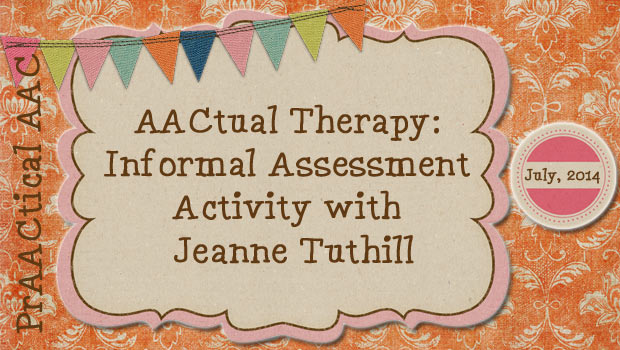
We are so pleased to have a return visit by SLP Jeanne Tuthill. In this post, she shares an informal assessment activity based around a Book of Favorites. Enjoy! ::::::::::::::::::::::::::::::::::::::::::::::::::::::::::::::::::::::::: Greetings from Massachusetts! My work at the Collaborative for Educational Services is on a school-year contract so I’m currently on summer break with my three girls. We’ve been plenty busy with fun summer activities but my learning and growing as an AAC therapist isn’t tied to my contract dates. I’ve also been busy watching webinars, reading some great books (educational as well as pleasure-reading), and following the Facebook feeds of some of my favorite AAC peeps! I really wish I could have attended ISAAC in Lisbon, Portugal this year…I loved seeing everyone’s photos and posts from what looked to be a spectacular conference! In my last post on assessment I shared with you an ice-breaker activity that is low-stress for... [Read More...]
June 23, 2014
by Robin Parker -
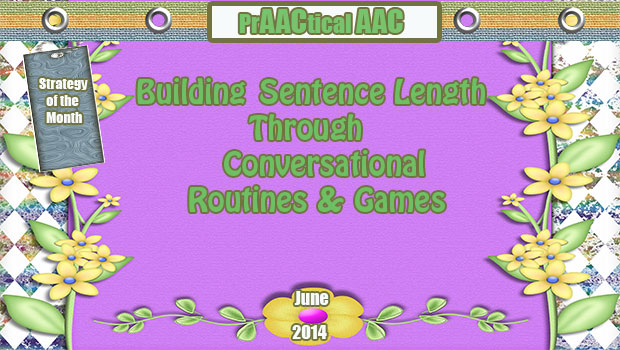
Building sentence length beyond the simple sentence level can be a lot of fun for those of us who love language. Additionally, and even more important, expanded sentences can provide communication impact and power to the communicator. Expanded sentences usually means moving from the simple to complex sentence. As Carole mentioned last week, we often begin with conjunctions like ‘because’, ‘but’, ‘so’, ‘if’, before’, after’. Here are some ideas for conversational routines and games that allow for frequent repetition with variety as well as strong communication power that will help with making it worthwhile to use longer sentences. “Pretty Please” Routine- This routine involves using ‘because’ to negotiate with longer sentences. This routine is reserved for requests that are possible but not always honored. In the case of teaching, we start with requests that can be honored if “pretty please because I worked hard or some other reasonable reason is... [Read More...]
June 17, 2014
by Carole Zangari -
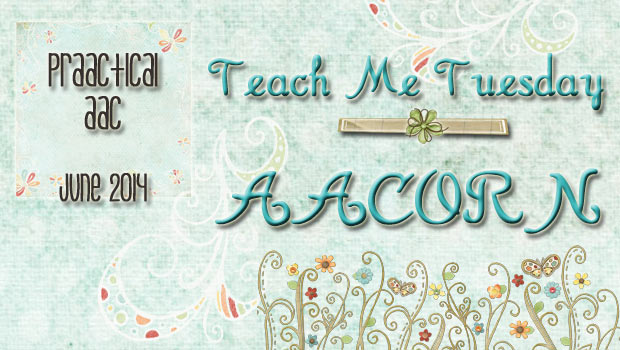
Looking for an app with a very different approach to AAC? Join us in learning about AACORN, developed collaboratively with the Murdoch Children’s Research Institute. General Product Information Video Overview Facebook Page Twitter: @aacorn Where to Go for Help: devteam@aacorn.co
April 3, 2014
by Carole Zangari -
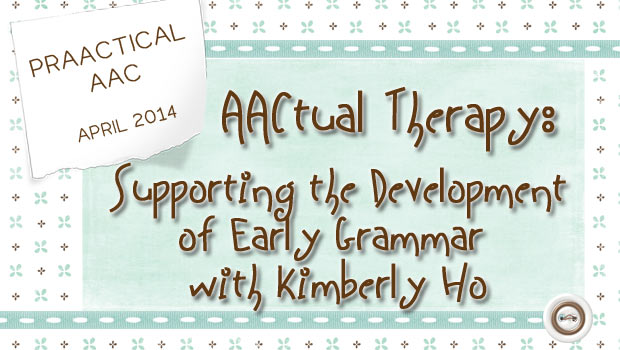
Our guest post for today is from SLP Kimberly Ho, an AAC specialist who operates a private practice, AAC Services. I met Dr. Ho many years ago when she was getting her master’s degree at Purdue University. She went on to get her doctorate and now consults for a number of public schools and works with individuals with AAC needs from preschoolers to adults. Kimberly is active in teaching (undergraduate and graduate courses), writing (published three articles in peer reviewed journals) and public speaking (15 presentations at regional, national and international conferences). In this post, she discusses some concepts in teaching grammar to people who are learning AAC. Traditionally, individuals with complex communication needs (CCN) were provided with communication boards or speech generating devices (SGDs) filled with topic specific vocabulary often called fringe words. The field of AAC is only just beginning to provide early communicators with access to Core... [Read More...]
March 27, 2014
by Carole Zangari -
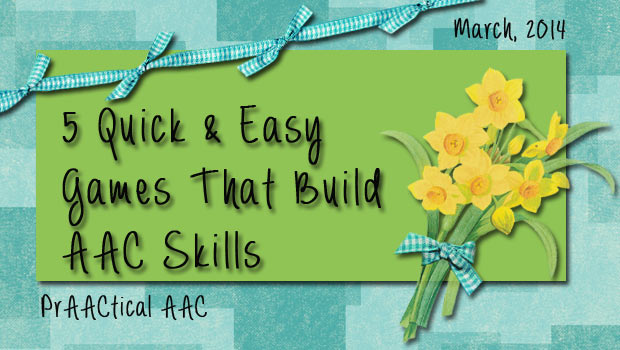
Have a few minutes and want to get in some core word prAACtice without making it seem like work? Giving the AAC learner a chance to boss us around and direct us do things just because they tell us to is something that has worked for us more times that we can count. Put the AAC learner in control and make it fun. Get your silly on and ham it up but remember to use aided language input throughout the process. Here are some ideas. They say: “Go,” “Sit,” “Tell,” or “Walk.” We act that out in the craziest way possible. They say: “Happy,” “You happy,” “Sad,” or “You sad.” We make the most ridiculous happy/sad faces imaginable. They say: “What,” “What is it?” or “What is that?” We use the context to figure out what they’re referring to and say “It is a ___.” They say: “Get the ____,”... [Read More...]
March 20, 2014
by Carole Zangari -
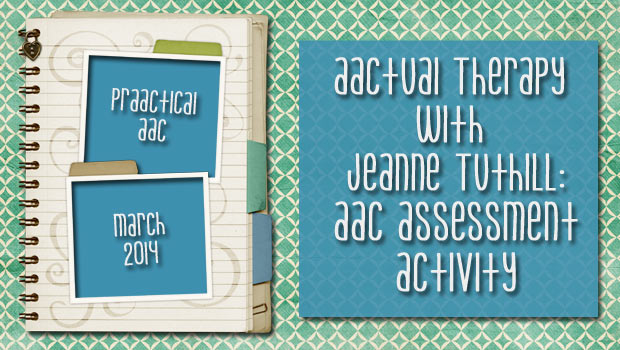
We’re so excited to introduce a new AACtual therapist, Jeanne Tuthill. Jeanne has been an SLP for over 15 years and has specialized in AAC for the past 6 years. As an AT specialist for the Collaborative Center for Assistive Technology and Training (CCATT) in Northampton, Massachusetts, Jeanne evaluates and provides consultation services for K-12 students in schools throughout Western Massachusetts. In addition, she provides workshops and professional development training in that region. Since 2012, Jeanne has served as an adjunct faculty member for the Assistive Technology Graduate Program at Simmons College. She has also presented at a number of regional and national conferences. You can see Jeanne here with her long-time student Lauren Suprenant, who is using a Step-by-Step Communicator, to share information about how she communicates with others (introduction strategy). Jeanne shares a little bit about her work and then discusses an activity that is used in their AAC... [Read More...]
February 26, 2014
by Carole Zangari -
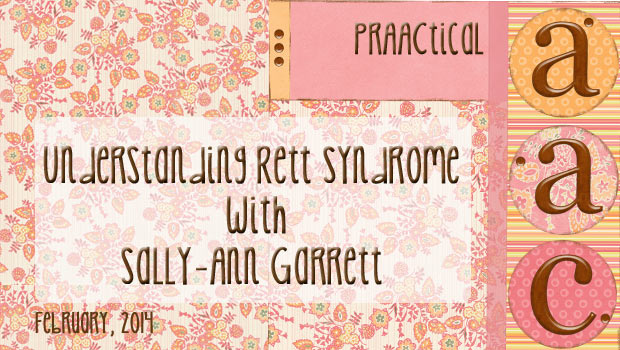
When we did our graduate training, there was little or no mention of Rett Syndrome, a genetic disorder involving a mutation of the MECP2 (Methyl CpG Binding Protein 2) gene on the long arm of the X chromosome. It is a complex disorder and the abilities of those who are affected by it are generally masked by the motor challenges that are a part of Rett. We’ve asked some professionals experienced in Rett and AAC to help us use this space to help us gain a better understanding of the disorder and its implications for AAC intervention. Sally-Ann Garrett (Highly Specialist Speech and Language Therapist; Reg. HCPC; MRCSLPT, Reg. ASLTIP) is one who agreed to do so and we are grateful for her perspective. Sally-Ann is semi-retired now but has worked with girls affected by Rett Syndrome for 30 of her 42 years as an SLT. She lived in Canada for a number... [Read More...]
February 17, 2014
by Carole Zangari -
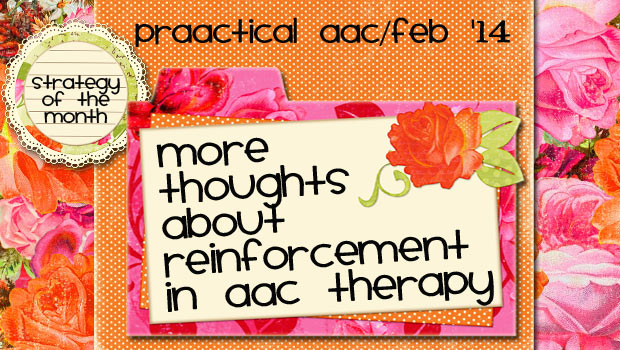
When we’re teaching AAC, our preferred means of responding to learners is with natural consequences, expansions, extensions, and verbal encouragement. Here are some of our prAACtical thoughts. Natural Consequences Nothing says ‘power’ like having someone respond based on what you just said. SLPs are quite familiar with this concept and use this regularly to provide ‘more’ tickles, crackers, and music. When we work with beginning communicators, we’re all about providing quick access to whatever the AAC learner requests. But we tend to lose sight of the need for natural consequences when working with learners on higher level language skills. True, it is more difficult to think of the natural consequence when we’re working on morphology, syntax, and semantics, but the principle is the same: Learning is enhanced when our responses are driven by the message that our client just produced. We’re working with Antonio to reduce ambiguity in his messages.... [Read More...]
November 23, 2013
by Carole Zangari -
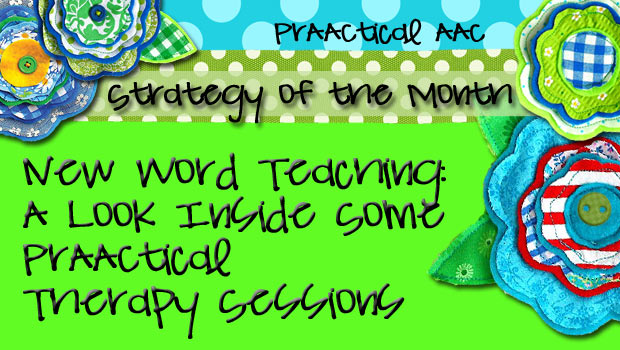
Since we’ve been talking about vocabulary instruction, we thought it might be fun to take a peek inside some therapy sessions where new words were being taught. In the examples below, we were teaching a core word and a Tier 2 vocabulary word over a few sessions. Here are some excerpts with their key intervention principles and practices. Target Words: do/did as an auxiliary (not main) verb Activities: Introduced a Visual Support (anchor chart): This explained the concept of ‘Helping Verbs,’ provided information on how they are used, listed them, and provided examples. These are effective tools for initial teaching, but are also invaluable for ongoing instruction. We use them extensively in language therapy, referring back to them often when we want to reinforce correct responses (look back at the visual together to further solidify the concept), help ‘fix’ incorrect responses (reteaching the pieces that didn’t stick), and facilitate self-correction... [Read More...]
October 3, 2013
by Carole Zangari -
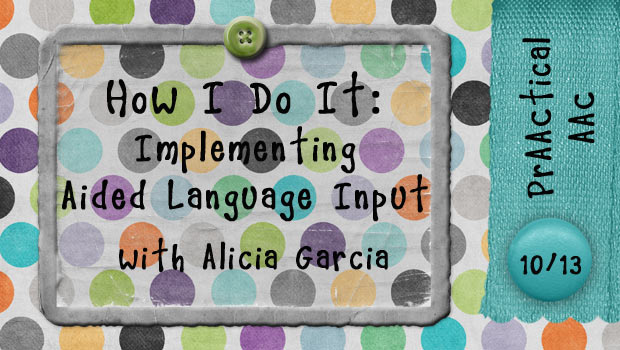
We are so pleased to have reconnected with SLP Alicia Garcia and are even more delighted that she agreed to do a guest post. Alicia is the clinical lead of the AAC Clinic at One Kids Place, a children’s treatment centre in northern Ontario. She has over 20 years of experience in pediatric rehabilitation practice in private and public settings, including clinical practice in AAC clinics and programs in Wisconsin, Florida, and now in Ontario. In this post, Alicia addresses one of our favorite clinical strategies in a very prAACtical way. Implementing Aided Language Stimulation: 8 Frequent Mistakes and How to Avoid Them Aided Language seems like a simple concept: Partners should model or demonstrate picture communication when talking to children who are learning to use picture communication, so that they would learn by example. Yet, when it comes to implementation we see frequent mistakes and misinterpretations. The most commons being:... [Read More...]









